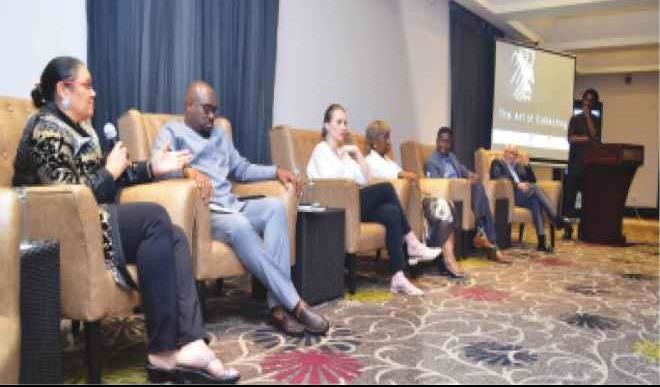Day stakeholders x-rayed collection in Nigeria
For Nigerians and non Nigerians, art professionals and academics as well as laymen and enthusiasts who gathered within the event hall of the popular Wheatbaker Hotel, Ikoyi, Lagos, few days ago, there could not have been a better time to examine the trends in the act of art collection. Coming on the heels of the […]


For Nigerians and non Nigerians, art professionals and academics as well as laymen and enthusiasts who gathered within the event hall of the popular Wheatbaker Hotel, Ikoyi, Lagos, few days ago, there could not have been a better time to examine the trends in the act of art collection.
Coming on the heels of the West Africa premier art fair, ArtXLagos, which organizers claimed attracted over 9, 000 visitors at the beginning of November and the African Culture and Design Festival (ACDF), that was said to have witnessed participation of delegates from over 100 countries, industry stakeholders could not but be at home with a forum on art collection- a practice, many believe is still at its teething stage.
Tracing the history of art collection in Nigeria, Prof. Ebun Clark, the first female Professor and Director in the Faculty of Arts, University of Lagos (UNILAG) who was among members of the panelists, said immediately after the country’s independence, there was an upsurge in carting away Nigerian antiques to foreign countries and the matter got worse to the extent that some Nigerians had to decide on their own to start acquiring these antiques.
“When the arts were being carted out of the country, many Nigerians were not even bothered. But some of us felt we can’t allow the trend to continue. We felt it is better if we were the ones collecting these antiques. So for somebody like me, I have started the collection since 1965 and up till today, I am still collecting. One thing I can say is that art collection is an addiction and if you don’t have the means, I will advise you don’t become addicted,” Prof. Clark, who is also the wife of the famous literary icon, J.P Clark, said.
Prof. Clark also noted that in art collection developing affection for the artwork being collected is essential to establish a nexus between the owner and the object being kept.
Olufemi Akinsanya, a foremost collector, agreed with Prof. Clark. He said it is important for those who want to engage in art collection to educate themselves on what they are getting into.
“I do educate myself. I do learn about artworks, auction houses and galleries, among others. Educating yourself will help you to refine your creativities. You cannot acquire everything, but you can devise a strategy to handle it, if you can,” he said.
Jess Castellote, who has been working as a project Manager in Nigeria since 1984 and currently the Director, Foundation for Contemporary and Modern Visual Arts (FCMVA) said whereas art collection is still evolving in Nigeria, commercialization of the existing ones as exemplified in their hosting in galleries, auctions houses and cinemas appear to be taking over.
However, a German freelance art historian, Dr. Charlotte Langhorst advocated for art freedom and the need for contemporary artists to stay in the country. She said it is unfortunate that it is not the old artworks that are being lost but also the contemporary ones.
The Chief Marketing Officer, Sterling Bank, Henry Bassey said the bank as one of the corporate organizations in Nigeria that believes in historical and cultural preservations, the idea is to start shifting attention into how to create works of arts from recycled wastes.
The Minister of Industry, Trade and Investment, Okechukwu Enelamah who was also at the event, underscored the importance of the creative industry in strengthening the country’s economy.
“The future is bright. Numbers do not lie and (recent market) figures tell the story of an industry that is evolving from a marginal to a sizeable segment of the economy,” he said.
Described as a pioneer in strategically combining art and hospitality, The Wheatbaker hotel is putting up 30 artworks comprising paintings, sculptures and mixed media works by known and emerging artists. The works range from Billy Omabegho, Tayo Adenaike, Obiora Anidi, Olu Amoda as well as Peju Alatise, who represented Nigeria at this year’s Venice Biennale to much acclaim.
“We have always seen art as an integral part of our corporate DNA, allowing our guests to find solace and inspiration from what is displayed on our walls,” Mosun Ogunbanjo, the Director of the Wheatbaker, said. “Before we completed the hotel, we had set aside significant resources for art, and continue to invest in providing an important regular platform for local and international artists through our quarterly exhibitions.”
Sandra Obiago, founder, SMO Contemporary Art who was among the panelists described the gathering as the vital intersection between culture, design and art for our human development. Obiago who has curated for the Wheatbaker art events since inception added that: “We are delighted that many hotels are now using art and hospitality to strengthen creativity in Nigeria, and provide an important platform for art and innovation.”
